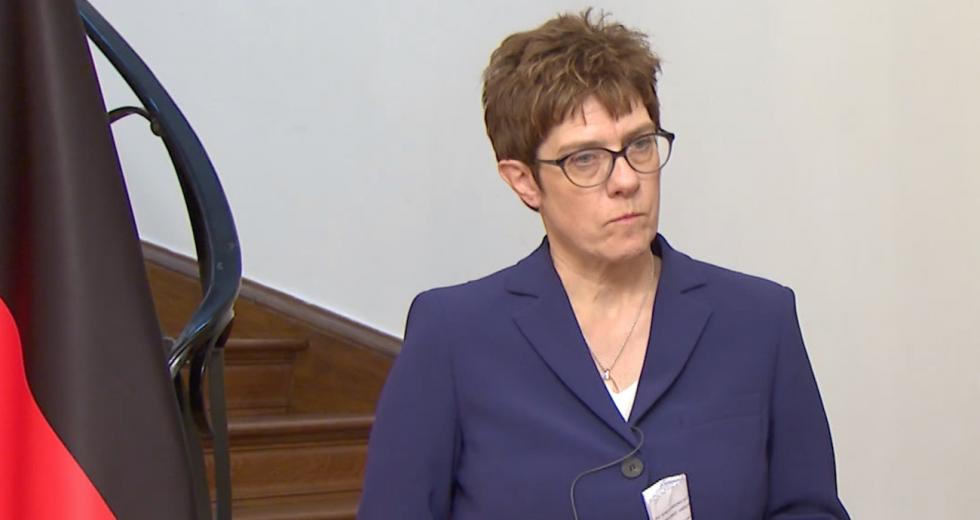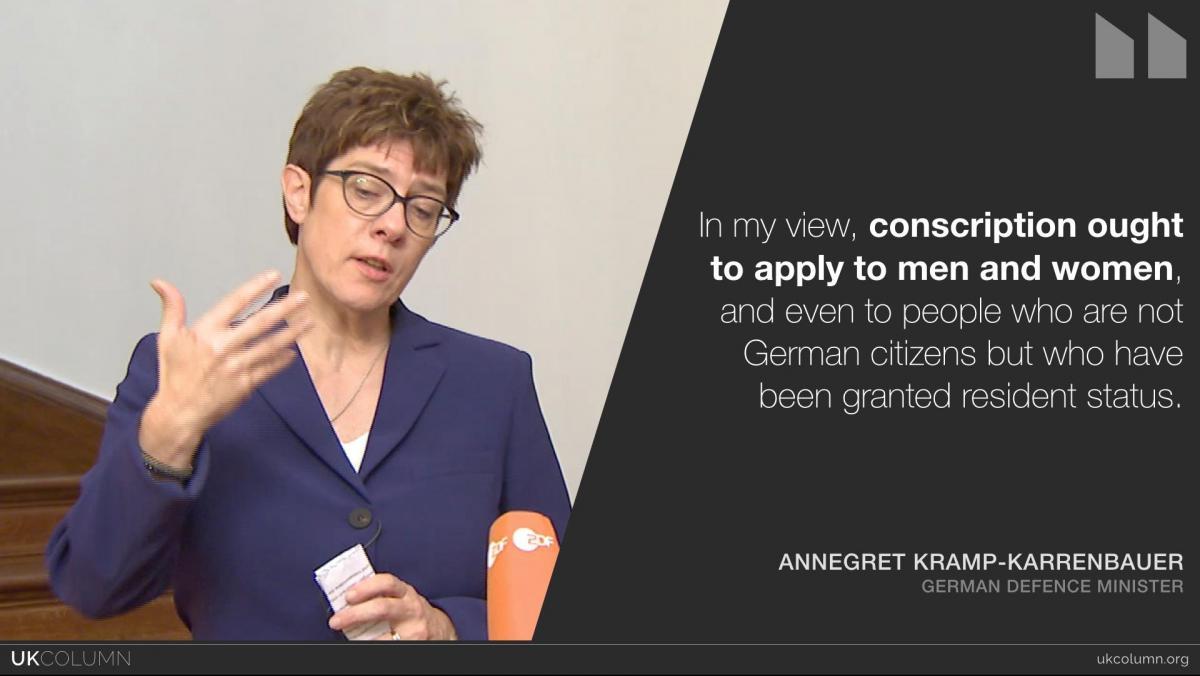
Annegret Kramp-Karrenbauer is a career politician. She joined the CDU while she was still in high school, and was elected to the city council of Püttlingen three years later.
From 2011 to 2018, she was Ministerpräsidentin (governor) of the Saarland, her native state. Given the Saarland’s history as a territory intermittently governed by France or under international mandate, she pressed for deep co-operation with France and even sought to make French the state’s co-official language in schooling.
From 2011 to 2014, Kramp-Karrenbauer was additionally the German cultural appointee provided for by the Franco-German Co-operation Treaty. There, she concentrated particularly on making vocational training a cross-border affair.
Her work in both of these posts foreshadowed the January 2019 Treaty of Aachen (Aix-la-Chappelle) between Germany and France, whose Article 10 states:
The two States will bring their education systems closer together by developing the mutual learning of each other’s languages; adopting, in accordance with their [respective] constitutional structures, strategies to increase the number of students studying the partner’s language, acting to achieve the mutual recognition of diplomas, and to establish Franco-German excellence tools for research, vocational education and training, as well as integrated dual Franco-German programmes under the auspices of higher education.
(Note particularly that the EU Defence Union inevitably requires a single European cadre of defence engineers and defence manufacturing companies.)
It appears to have been Angela Merkel who provided the impetus to take Kramp-Karrenbauer from the Saarland to Berlin. During 2018, Kramp-Karrenbauer was given two new appointments at federal level in her party apparatus:
February 2018—Generalsekretärin (chief whip), after which appointment she was soon charged by the party with delivering a two-year series of fundamental reforms culminating in a new manifesto in December 2020.
October 2018—Bundesvorsitzende (national chairwoman).
In December 2018, during the Kerch Strait crisis, Kramp-Karrenbauer appeared on Germany’s leading chat show, Anne Will, to air the idea of barring Russian shipping from European and U.S. ports.
In February 2019, in an interview with foreign policy think tank DGAP (the German sister body to the CFR and Chatham House), Kramp-Karrenbauer defended her pronouncement that Russia was seeking to subvert Germany:
Nun klagen viele über die Wirtschaftssanktionen der EU. Aber eine Alternative nennen die Kritiker nicht. Weder sind sie der Meinung, man müsse Russlands völkerrechtswidriges Verhalten hinnehmen, noch haben sie eine Idee für andere Sanktionen. Da wir ein militärisches Eingreifen ausschließen, bin ich für einen Erhalt der Sanktionen, solange keinem etwas Klügeres einfällt.
“Now, a lot of people are grumbling about the EU’s economic sanctions, but the critics are failing to suggest an alternative. They don’t believe we ought to counter Russia’s breaches of international law, nor do they have ideas about other sanctions. As we are excluding a military attack, I advocate keeping the sanctions in place as long as no-one has come up with a cleverer idea.”
In March 2019, as new Christian Democrat party chairwoman but still months before being appointed Defence Minister, Kramp-Karrenbauer called for more funding for Germany’s armed forces and pleaded for a relaxation of Germany’s famously stringent arms export legislation to allow joint EU construction of military equipment:
Durch unsere sehr strengen Regeln und die noch strengere Auslegung dieser Regeln machen wir gemeinsame europäische Projekte derzeit fast unmöglich … dann muss man sich auch auf europäische Regeln verständigen. Diese werden dann nicht so strikt wie die deutschen Vorschriften sein können.
“We are currently making common European projects all but impossible with our strict rules and the even stricter interpretation of those rules … We are going to have to agree on European [defence rules], and they will not be as strict as German regulations can be.”
The same month, in a Welt am Sonntag opinion piece responding to President Macron’s piece in the European press setting out his policies for EU integration, Kramp-Karrenbauer wrote:
Im nächsten Schritt könnten wir mit dem symbolischen Projekt des Baus eines gemeinsamen europäischen Flugzeugträgers beginnen, um der globalen Rolle der Europäischen Union als Sicherheits- und Friedensmacht Ausdruck zu verleihen.
“Our next step might be the symbolic project of a jointly-constructed European aircraft carrier, to give expression to the EU’s global role as a power for security and peace.”
In April 2019, in an interview with Stern magazine, Kramp-Karrenbauer stated in terms that Germany ought to reintroduce conscription and extend it to both sexes and to resident aliens:
Aus meiner Sicht müsste der [Pflichtdienst] für Männer und Frauen gelten, und auch für Menschen, die keine deutschen Staatsangehörigen sind, aber ein verfestigtes Aufenthaltsrecht haben. Wir werden das alles demnächst auch mit der Partei in einem weiteren Werkstattgespräch diskutieren.
“In my view, conscription ought to apply to men and women, and even to people who are not German citizens but who have been granted resident status. First of all, we are going to discuss all this with the Christian Democrat party in a working group still to be held.”

The political momentum which Kramp-Karrenbauer was referring to had taken shape in August 2018. An article of that month in Germany’s newspaper of record, the Frankfurter Allgemeine Zeitung, cites (without verbatim quotation) Kramp-Karrenbauer herself as already advocating that her Christian Democrat party debate at length whether to extend a renewed draft to women, and as arguing that this ought to be one of the key planks of the party’s fundamental reforms, due to begin that autumn and to continue until formulated as a manifesto for the 2020 elections. (Kramp-Karrenbauer had begun airing this conscription policy in a July 2018 video message.)
Also in August 2018, a party colleague of hers and Bundestag member from the state of Hesse, Oswin Veith, argued to Germany’s largest-circulation newspaper, Bild-Zeitung, that the age of liability for the reinstituted draft ought to be 16 to 35. Veith is also Chairman of the Bundeswehr Reservists’ Association.
In the April 2019 Stern interview, Kramp-Karrenbauer stated regarding her leisure pursuits:
“I’m a fan of AC/DC. When preparing for political debates, heavy metal usually does the trick.”
Will Kramp-Karrenbauer pursue these policies as she helps build an EU Defence Union?

